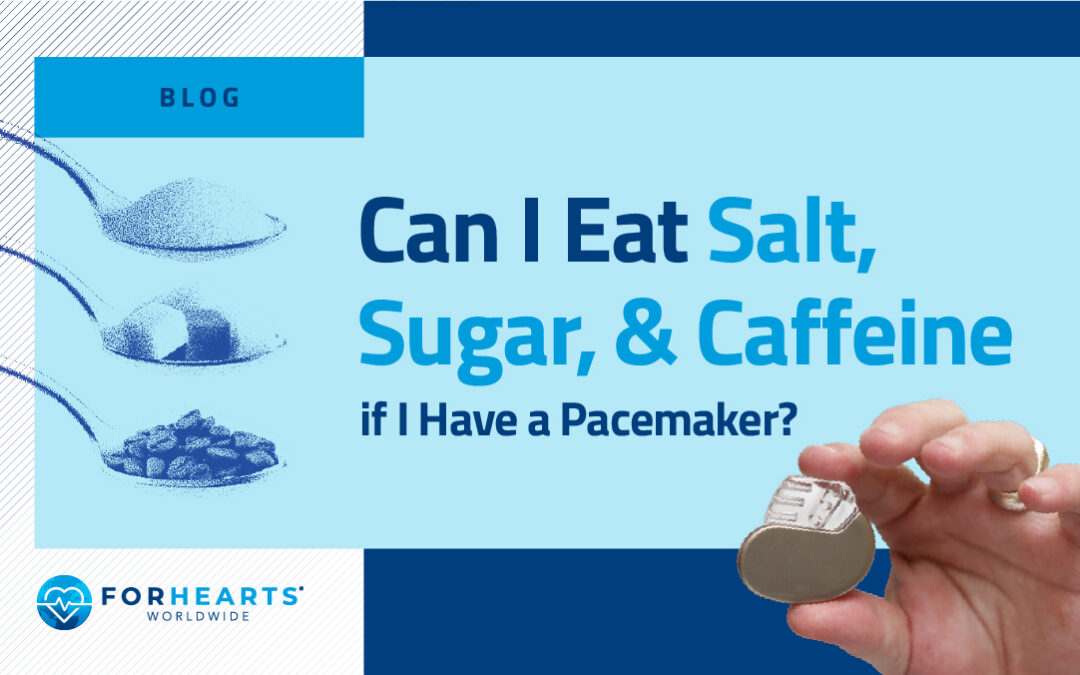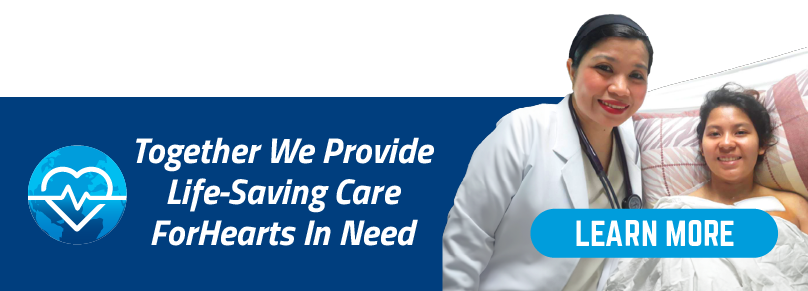A pacemaker can help those suffering from heart rhythm issues to live their life to the fullest. The most common reason for a pacemaker is arrhythmia, meaning the heart has an abnormal rhythm. Approximately one in 18 people, or 5 percent of the U.S. population has an arrhythmia, with one in four adults over the age of 40 projected to develop an irregular heartbeat, according to Scripps Health.
If you are living with a pacemaker to treat your heart arrhythmia, you want to focus on eating a heart healthy diet. That is because excess sodium and sugar, along with caffeine, can potentially affect heart rhythm issues and your pacemaker. Here is what you need to know about the impacts these three common food ingredients can have on your heart health.
Sodium
A diet high in sodium can lead to high blood pressure, or hypertension, which is a risk factor for developing cardiovascular issues, including heart disease, heart failure, heart attack, angina, and peripheral artery disease. That is because excessive sodium can lead to fluid retention and increased blood volume, putting a strain on the heart.
High blood pressure is also a risk factor for developing atrial fibrillation (AFib), the most common type of heart arrhythmia. In fact, high blood pressure can almost double your chances of developing AFib, according to research from the National Institutes of Health. If you already have heart arrhythmia and a pacemaker, you want to be sure you’re keeping your blood pressure within a normal range and your sodium intake low.
The American Heart Association recommends a maximum intake of 2,300 milligrams (mg) of sodium per day, with 1,500 mg being the ideal daily limit for most adults. For those diagnosed with hypertension or cardiovascular issues, cutting back by 1,000 mg a day can improve blood pressure and heart health. If you have heart arrhythmia and/or a pacemaker, your doctor may have you on a restricted, low sodium diet that’s even less.
When it comes to cutting sodium out of your diet and lowering your blood pressure, the DASH diet can be a good place to start. The DASH eating plan, which stands for “Dietary Approaches to Stop Hypertension,” emphasizes eating vegetables, fruits, whole grains, fish, poultry, beans, nuts and vegetable oils, and fat-free or low-fat dairy products, while limiting your intake of foods high in saturated fat, sodium, and added sugars.
Sugar
When it comes to sugar’s effects on your health, its impacts to your heart may not be the first concern that comes to mind. However, the effects of a high sugar diet can lead to cardiovascular issues or exacerbate existing issues.
Excessive sugar intake has been linked to obesity, diabetes, and metabolic syndrome, all of which are risk factors for heart disease, including heart rhythm issues. Research indicates that people with diabetes mellitus are 40% more likely to develop atrial fibrillation compared to people without diabetes. Additionally, type 2 diabetes patients are at a higher risk for needing a pacemaker and at an increased risk of suffering a cardiovascular event even with a pacemaker, according to the Journal of Diabetes Research.
Besides these indirect impacts on cardiovascular health, a diet high in sugar can have a similar effect on the heart as high sodium and high saturated fat diets. High sugar intake has been linked to high blood pressure and high cholesterol, particularly high levels of LDL or “bad” cholesterol, which can clog the arteries supplying oxygen and blood flow to the heart, increasing the risk of heart disease, heart attack, and stroke. This is because when you have a consistently high amount of sugar in your diet, your body is forced to store the excess sugar calories as triglycerides, which can contribute to high LDL cholesterol levels.
So how much sugar is considered “excessive sugar”? The American Heart Association recommends limiting added sugars to “no more than 6 percent of calories each day.” That translates to 6 teaspoons of sugar (100 calories) per day for women and 9 teaspoons (150 calories) per day for men. For perspective on how much (or how little) that is, there are over 9 teaspoons of sugar in a 12 oz can of Coca-Cola (39 grams of sugar, with 4 grams equaling 1 teaspoon).
You can see why so many Americans are getting too much sugar and the health consequences that come with it. Packaged, processed foods are some of the biggest containers of added sugars and sodium. Removing foods like processed meats, prepackaged snacks, sugar-sweetened drinks, and desserts, and replacing them with unprocessed lean meats, nuts, vegetables, and fruits that are naturally sweet can help you purge added sugars from your diet.
Caffeine
If you are like many Americans, you can’t start your day without an energy-boosting jolt from caffeine. However, the “jolt” from this stimulant can affect your cardiovascular system, potentially leading to changes in heart rhythm, heart palpitations, or irregular heartbeat.
If you have heart arrhythmia and/or a pacemaker, is it still safe to grab a cup of your favorite caffeinated beverage? It depends on your sensitivity and your doctor’s recommendations, as the body’s response to caffeine can vary between people.
Overall, studies looking at the relation between “commonly ingested amounts” of caffeine and arrhythmia have produced inconsistent results, with multiple clinical studies failing to show any link between caffeine consumption and AFib episodes. Therefore, most doctors agree that consuming moderate amounts of caffeine (up to 300 mg or the equivalent of 3 to 4 cups of coffee per day) is generally safe for the heart and doesn’t lead to abnormal heart rhythm or arrhythmias.
The key is staying within this “moderate amount.” Foods with higher concentrations of caffeine, such as energy drinks, have been linked to serious cardiovascular events, many of them in younger people with no preexisting heart issues. Several studies have found concerning links between energy drink overconsumption and arrhythmias, coronary artery spasms, and sudden cardiac death.
Many of these advertised “energy” drinks have a caffeine content that can range from 50 mg to 500 mg per bottle—that’s 200 mg more than what’s considered safe for the entire day! Besides high levels of caffeine, many energy drinks also contain herbs, ginseng, taurine, and riboflavin, combinations that can have unknown or even detrimental effects for those with heart rhythm issues.
If you are craving an energy boost, stick with that cup of joe and moderate caffeine intake over that “extreme” jolt from that hopped up energy drink. Making safe, smart, and balanced dietary choices are key to maintaining your pacemaker-powered heart and living your healthiest life.
You can help hearts in need around the world live their healthiest with the gift of a life-saving pacemaker. See how you can support the ForHearts mission through our donation opportunities.





Why don’t energy drink companies put the milligrams of caffeine on their labels??
What is the caffeine content on a 12 oz can of Celsius??
Thanks
No, I have a pacemaker defibrillator. I drink two Celsius energy drinks a day. Is that OK?
At my cardiac appointment I was told my pacemaker is working 98% of the time. Does this mean it will have a shorter life? I have had it for 15 years and due to have the battery replaced.
My husband’s pacemaker works 10% of the time because his heart works properly 90% of the time.
my name is lilavati patel.my age is 75yrs.i have a pacemaker put in jan.2024.some wires are popping out ant it is hurting me.my surgeon suggested that he can put the wires behind my muscles
Is it safe thank you
I just received my pacemaker 3 weeks ago glad I did I feel the difference in a good way my concern is that I like coffee on my off day I sip on it all day my formula is 4 spoons of decaf to 2 spoons of caffeine to make 6 cups
I am type2 diabetic is this safe
Please 🙏 answer
Why not
Would like to have update on the pacemaker process. Thank you.
Thanks! Helpful!
My stomach hurts every time I eat?
Could I have cancer also. Would all the testing I took before installed show cancer????